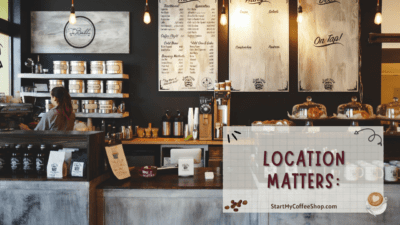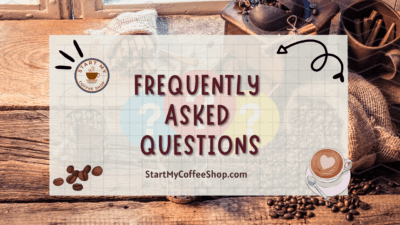With the aroma of freshly brewed coffee, the enticing allure of caffeine, and the desire to create a bustling hub for coffee lovers—opening a kiosk coffee business can be an exciting venture. However, before embarking on this caffeine-fueled journey, it’s crucial to understand the startup costs involved.
The estimated startup costs for opening a kiosk coffee business can vary, but typically range from $10,000 to $50,000, depending on factors such as location, equipment, renovations, permits, initial inventory, and marketing expenses.
In this article, I will delve into the intricacies of startup costs for a kiosk coffee business, exploring various factors that influence the investment required and providing insights to help aspiring entrepreneurs plan their financial path to growth.
1. Location Matters:
When it comes to opening a kiosk coffee business, the significance of choosing the right location cannot be overstated. The improvement and profitability of your venture depend heavily on factors such as foot traffic, proximity to your target customers, and the cost of leasing or renting the space. The location you select will have a direct impact on your startup expenses and the number of customers you can attract.
Prime locations in bustling commercial areas, near offices, universities, or transit hubs, tend to offer a higher potential for customer traffic. These areas are often bustling with people seeking a quick and convenient caffeine fix. However, it’s important to consider that these sought-after locations may come with higher rental costs due to their desirability.
Conducting thorough market research is essential in identifying the optimal location for your kiosk coffee business. This research involves analyzing demographics, studying foot traffic patterns, and understanding the preferences and behaviors of your target customers. By gaining insights into the local market, you can make informed decisions about where your kiosk will thrive.

Finding the right balance between visibility and affordability is crucial. While it may be tempting to secure a high-profile location, it’s equally important to ensure that the associated costs are within your budget. Careful consideration of the lease or rental costs, along with the expected return on investment, will help you determine if a particular location is financially viable for your business.
In addition to foot traffic and cost, it’s important to assess the overall infrastructure and accessibility of the location. Consider factors such as parking availability, public transportation access, and neighboring businesses that can complement your coffee offerings.
Ultimately, the optimal location for your kiosk coffee business will depend on various factors, including your target market, competition, and financial capabilities. By conducting thorough market research and striking the right balance between visibility and affordability, you can position your kiosk for greatness, attracting a steady stream of customers and maximizing your chances of profitability.
Remember, finding the right location is a crucial step in building a strong foundation for your kiosk coffee business.
Read more about Startup Coffee Shop Costs: A Financial Breakdown
2. Equipment and Setup:
Equipping your kiosk coffee business with the necessary machinery, furniture, and fixtures is a critical aspect that significantly contributes to startup costs. To create a smooth and efficient operation, you’ll need to invest in a range of equipment including coffee machines, grinders, blenders, refrigerators, display cases, tables, chairs, and signage.
Coffee machines are the heart of any coffee business. They come in various types, such as espresso machines or drip coffee makers, and can range in price depending on the brand and features. Investing in a high-quality coffee machine ensures that you can consistently deliver a delicious cup of coffee to your customers, meeting their expectations and providing a satisfying experience that keeps them coming back.
Grinders are essential for freshly grinding coffee beans, unlocking the flavors and aromas that discerning coffee lovers crave. A reliable grinder will allow you to achieve the desired consistency and control the quality of each cup. Similarly, blenders come in handy for creating delightful blended coffee beverages, adding versatility to your menu.
Refrigerators are vital for storing perishable items like milk, cream, and other ingredients. Display cases not only showcase tempting pastries and snacks but also help maintain their freshness. Investing in durable and energy-efficient refrigeration equipment is essential for ensuring food safety and minimizing waste.
Tables and chairs provide a comfortable and inviting space for customers to enjoy their coffee. Depending on your kiosk’s size and design, you may need to consider space-saving options or customizable furniture to maximize your available area. Additionally, attractive and informative signage will help attract customers and communicate your brand effectively.
When budgeting for equipment, it’s important to prioritize quality and durability. While high-quality equipment may come with a higher upfront cost, it pays off in the long run by reducing maintenance and replacement expenses. Investing in reliable machinery also minimizes downtime, ensuring smooth operations and customer satisfaction.
Consider your operational needs and growth projections when selecting equipment. Assess the capacity, features, and efficiency of each item to ensure it aligns with your business goals. Researching reputable suppliers, reading reviews, and seeking recommendations from industry professionals can help you make informed decisions and avoid costly mistakes.
By investing in top-notch equipment, you’ll be able to deliver consistent, high-quality products that meet or exceed customer expectations. This fosters customer loyalty, and positive word-of-mouth, and ultimately contributes to the achievement and profitability of your kiosk coffee business.
3. Renovations and Interior Design:
In the competitive world of coffee businesses, creating an inviting and aesthetically pleasing environment is essential to stand out and attract customers to your kiosk. Renovations and interior design expenses are a significant part of the startup costs and involve various elements such as painting, flooring, lighting, countertops, shelving, and branding.
Painting the space in appealing colors can set the mood and create a welcoming atmosphere. Consider colors that align with your brand and evoke feelings of warmth and relaxation. The right flooring choice, whether it’s hardwood, tiles, or vinyl, should be durable, easy to clean, and visually appealing. Lighting is another crucial aspect that sets the ambiance and highlights the products on display. Balancing natural light with strategic artificial lighting can create an inviting and cozy atmosphere for customers.
Countertops and shelving should be both functional and visually appealing. They should provide ample space for preparing and serving coffee while showcasing your products attractively. Well-designed and organized shelving helps optimize the use of space and allows customers to browse and select items with ease.
Branding elements such as logos, signage, and menu boards are essential for creating a cohesive and memorable identity for your kiosk. These elements should reflect your brand’s personality and resonate with your target audience. Collaborating with experienced designers or contractors who understand the nuances of creating efficient and visually appealing coffee spaces can ensure that your kiosk reflects your brand while optimizing customer flow and comfort.
Working with professionals can help you make informed decisions about the layout, flow, and design elements that will enhance the overall customer experience. They can provide valuable insights and expertise in creating an environment that encourages customers to linger, savor their coffee, and return for future visits.
Remember, the ambiance and aesthetics of your kiosk coffee business can leave a lasting impression on customers and contribute to their overall satisfaction. Striking the right balance between functionality and ambiance through thoughtful renovations and interior design will help your kiosk stand out from the competition and create a welcoming space where customers can enjoy their coffee and indulge in the unique experience your brand offers.
4. Licenses, Permits, and Legal Considerations:
Compliance with local regulations and obtaining the required licenses, permits, and insurance is of utmost importance when operating a kiosk coffee business. These regulatory requirements ensure that your business is operating legally and uphold the necessary health and safety standards. It is crucial to allocate funds in your startup budget for the associated costs of licenses, permits, certifications, and insurance.

The specific licenses and permits needed may vary depending on your location and local regulations. It is essential to research and understand the requirements specific to your area. Common permits may include business licenses, food service permits, and health department approvals. These permits demonstrate that your kiosk coffee business has met the necessary standards to operate and serve food and beverages to the public.
Additionally, obtaining food safety certifications is crucial for ensuring that your coffee products are prepared and served safely and hygienically. These certifications may require training and adherence to specific protocols, demonstrating your commitment to food safety practices.
Liability insurance is another important aspect to consider. This insurance protects your business in case of accidents, injuries, or property damage that may occur on your premises. It provides financial coverage and peace of mind, safeguarding your business from potential legal and financial consequences.
To navigate the complex landscape of permits, licenses, and insurance, it is advisable to consult with legal professionals or local authorities. They can guide you through the process, help you understand the specific requirements for your kiosk coffee business, and ensure compliance with the relevant laws and regulations. By proactively addressing these legal aspects, you can avoid potential fines, penalties, or legal complications in the future, allowing your business to operate smoothly and in full compliance with the law.
Read more about Startup Business Cost for a Coffee Shop: Assessing the Startup Expenses for Your Coffee Shop
5. Initial Inventory:
Building an initial inventory is a vital step when launching a kiosk coffee business. This inventory encompasses a range of items such as coffee beans, syrups, milk, pastries, and other consumables that are necessary to meet customer demands and provide a diverse menu. Careful consideration should be given to calculating the right quantity and variety of products to strike a balance between meeting customer preferences and minimizing waste.
When it comes to coffee beans, selecting high-quality options that align with your target market’s preferences is essential. Consider offering a variety of blends and single-origin coffees to cater to different taste profiles. It’s important to estimate the average consumption rate and projected demand to ensure an adequate supply without excessive waste. Monitoring sales and customer preferences can help fine-tune your inventory management over time.
In addition to coffee beans, syrups, and milk are key ingredients for creating a variety of specialty coffee beverages. Assessing popular flavors and considering seasonal offerings can help you curate a menu that appeals to a wide range of customers. Having a clear understanding of the shelf life and expiration dates of these perishable items is crucial to avoid wastage and maintaining product quality.
Pastries and other food items can complement your coffee offerings and provide additional revenue streams. Collaborating with local bakeries or suppliers to provide fresh and delicious pastries can enhance the overall customer experience. However, it’s important to strike a balance between offering a sufficient selection and avoiding excessive inventory that may go unsold.
Building strong relationships with reliable suppliers is essential for maintaining a smooth supply chain. Negotiating favorable terms, such as pricing, delivery schedules, and minimum order quantities, can help optimize your initial inventory investment. Regularly evaluating the performance of suppliers and seeking feedback from customers can ensure that your inventory meets their expectations.
Implementing an inventory management system or software can help track sales, monitor stock levels, and automate reordering processes. This allows you to efficiently manage your inventory, avoid shortages, and reduce the risk of overstocking.
6. Marketing and Branding:
Effective promotion is a vital component of establishing a kiosk coffee business. Allocating a portion of your startup budget to marketing expenses is crucial for creating awareness, engaging with your target audience, and differentiating your brand in the competitive coffee landscape.
A well-designed and user-friendly website is a fundamental marketing tool. It serves as a virtual storefront where potential customers can learn about your offerings, location, and business values. Investing in professional website development ensures that your online presence reflects the quality and experience customers can expect from your kiosk.
Social media platforms offer powerful marketing opportunities to connect with your target audience and build a community around your brand. Consistent and engaging social media management helps create buzz, share updates, showcase your products, and engage with customers through comments, messages, and reviews.
Signage is an essential element for attracting customers and communicating your brand identity. Eye-catching and informative signage placed strategically can draw attention to your kiosk and entice passersby to stop and try your coffee. Promotional materials such as business cards, flyers, and coupons can also help spread the word and encourage repeat visits.
Investing in targeted advertising campaigns, both online and offline, can help reach a wider audience and drive foot traffic to your kiosk. This can include digital advertising on platforms like Google Ads or social media ads that specifically target users in your local area. Offline advertising options may include local publications, community boards, or partnerships with nearby businesses to cross-promote each other.
Marketing expenses should be viewed as an investment rather than a cost. By effectively promoting your kiosk coffee business, you create brand recognition, generate customer interest, and build a loyal clientele. This can lead to increased foot traffic, higher sales, and positive word-of-mouth recommendations. Remember to regularly assess the effectiveness of your marketing efforts, track key performance metrics, and adapt your strategies to ensure continued growth in attracting and retaining customers.
7. Staffing and Training:
Staffing and training are important considerations for kiosk coffee businesses, even if the team is smaller compared to larger establishments. The costs associated with hiring skilled baristas and providing comprehensive training should not be overlooked. Investing in your staff ensures consistent quality, efficient service, and a positive customer experience.
Baristas are the face of your kiosk coffee business, responsible for crafting and serving delicious beverages. Hiring individuals with a passion for coffee and a strong work ethic is essential. Skilled baristas bring their expertise to the table, ensuring that each cup is expertly prepared and meets the high standards of your brand.

Comprehensive training programs are necessary to equip your baristas with the necessary skills and knowledge. Training should cover a range of areas, including coffee brewing techniques, espresso extraction, milk steaming, latte art, customer service, and product knowledge. A well-trained barista can confidently interact with customers, make recommendations, and handle various equipment, ensuring a seamless and enjoyable experience for patrons.
Incorporating wages, benefits, and ongoing training programs into your startup budget is crucial for attracting and retaining talented baristas. Competitive wages and benefits packages demonstrate your commitment to valuing and supporting your team. Additionally, offering ongoing training opportunities, such as coffee workshops or certifications, helps develop the skills and expertise of your staff, enabling them to stay updated with industry trends and deliver an exceptional coffee experience.
By investing in staffing and training, you are investing in the foundation of your kiosk coffee business. A capable and motivated team contributes to the overall performance of your business by consistently delivering high-quality beverages and exceptional customer service. Remember to create a positive work environment, provide growth opportunities, and foster a sense of teamwork and camaraderie among your staff. This will not only enhance the customer experience but also contribute to the long-term growth and profitability of your kiosk coffee business.
Read more about Starting Costs for Coffee Shop: Navigating Its Starting Costs
8. Contingency Fund:
Unforeseen circumstances and unexpected expenses are an inevitable part of starting and running any business. That’s why it’s crucial to establish a contingency fund to handle emergencies, equipment repairs, slow business periods, or any other unforeseen events that may arise. By setting aside a percentage of the startup budget as a safety net, entrepreneurs can ensure they have the resources to navigate challenges without compromising the stability of their kiosk coffee business.
A contingency fund serves as a financial buffer, providing peace of mind and the ability to respond effectively to unexpected situations. Emergencies can range from equipment breakdowns or sudden repairs to unforeseen legal or regulatory issues. Having funds readily available enables entrepreneurs to address these issues promptly, minimizing disruptions to daily operations and customer service.
Additionally, slow business periods are common in the early stages of a kiosk coffee business or during certain seasons. A contingency fund can help cover expenses during these periods when revenue may be lower than expected. It provides the necessary cash flow to sustain the business and bridge any gaps until sales pick up again.
Moreover, unforeseen events such as changes in market trends, shifts in customer preferences, or unexpected competition may require additional marketing efforts or strategic adjustments. Having a contingency fund allows entrepreneurs to invest in targeted marketing campaigns, product innovations, or staff training to adapt to evolving circumstances and maintain a competitive edge.
Summary
Starting a kiosk coffee business can be a fulfilling venture for passionate entrepreneurs. By understanding the various components that contribute to startup costs, individuals can plan their financial resources more effectively, ensuring a solid foundation for their coffee business.
While the figures may vary depending on location, aspirations, and market conditions, a comprehensive analysis of expenses related to location, equipment, setup, legalities, inventory, marketing, staffing, and contingency funds will help entrepreneurs embark on their coffee journey with confidence and financial preparedness.
So, grab your apron and embrace the world of kiosk coffee entrepreneurship, one cup at a time!
Frequently Asked Questions

Question: How do I choose the right location for my kiosk coffee business?
Answer: When selecting a location, consider factors such as foot traffic, proximity to target customers, rental costs, and competition.
Question: What equipment do I need to start a kiosk coffee business?
Answer: Essential equipment for a kiosk coffee business includes coffee machines, grinders, blenders, refrigerators, display cases, tables, chairs, and signage.
Question: What permits and licenses are required to operate a kiosk coffee business?
Answer: Operating a kiosk coffee business often requires licenses, health permits, food safety certifications, and liability insurance.
To learn more on how to start your own coffee shop checkout my startup documents here
Please note: This blog post is for educational purposes only and does not constitute legal advice. Please consult a legal expert to address your specific needs.

Hi! I’m Shawn Chun
My adventure in coffee began when I first launched my first coffee shop back in the early 2000s. I had to figure out so many things on my own and to make it worse within 2 years of opening two large corporate coffee chains moved in just blocks away from me!
As I saw smaller and even some larger coffee shops in the neighborhood slowly lose customers to these giant coffee chains and slowly close up shop, I knew that I had to start getting creative…or go out of business.
I (like you may be) knew the coffee industry well. I could make the best latte art around and the foam on my caps was the fluffiest you have ever seen. I even had the best state-of-the-art 2 group digital Nuova Simonelli machine money could buy. But I knew that these things alone would not be enough to lure customers away from the name brand established coffee shops.
Eventually, through lots of trial and error as well as perseverance and creativity I did find a way to not only survive but also thrive in the coffee/espresso industry even while those corporate coffee chains stayed put. During those years I learned to adapt and always faced new challenges. It was not always easy, however, in the end, I was the sole survivor independent coffee shop within a 10-mile radius of my location. Just two corporate coffee chains and I were left after that year. All told the corporate coffee chains took down over 15 small independent coffee shops and kiosks and I was the last one standing and thriving.
Along the years I meet others with the same passion for coffee and I quickly learned that it is not only “how good a barista is” that makes a coffee shop successful, but the business side of coffee as well.
Hence why I started this website you are on now. To provide the tools and resources for up and coming coffee shop owners to gain that vital insight and knowledge on how to start a coffee shop successfully.
Stick around, browse through my helpful blog and resources and enjoy your stay! With lots of LATTE LOVE!
Shawn







